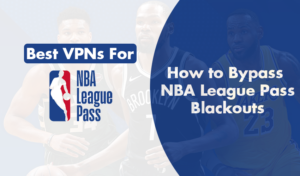Obfuscated servers, a specialty feature in certain VPN servers, effectively camouflage your VPN usage. This allows you unhindered access to geo-restricted content without the threat of detection. As VPN utilization grows to circumvent content restrictions, internet service providers (ISPs), authoritarian governments, and streaming platforms have responded by implementing anti-VPN technologies. They employ Deep Packet Inspection (DPI) to identify and block VPN traffic. This is where obfuscated servers come into play.
NordVPN – Ensuring Safe Browsing with Obfuscated Servers
NordVPN offers obfuscated servers that not only hide your VPN connection but also ensure optimal security without compromising on connection performance. It boasts one of the most advanced VPN security suites.
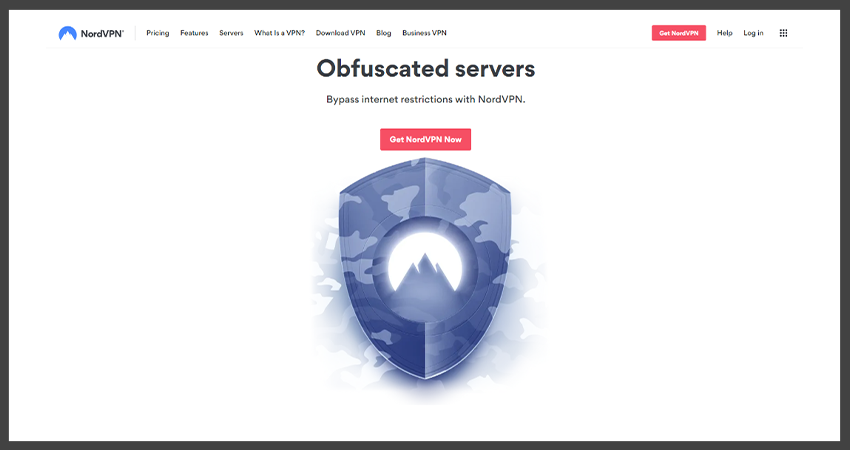
- Top-tier suite of security.
- Unblocks popular streaming sites.
- 24/7 customer support.
This article will shed light on how obfuscated servers function and how to utilize them, and introduce some of the best VPNs that offer this feature. Read on to learn more!
Top VPNs Offering Obfuscated Servers
Here are the top 3 VPNs that provide obfuscated servers:
- NordVPN – Our top pick for VPN with obfuscated servers
- Surfshark – A VPN with advanced obfuscation features
Decoding VPN Obfuscation
VPN obfuscation effectively disguises VPN traffic as regular internet traffic by concealing any information related to a VPN protocol in the data packets.
While the raw data remains encrypted, DPI cannot detect VPN usage, unless the data packet is manually inspected. Thus, the VPN-encrypted traffic can bypass VPN blocks and firewalls.

ISPs and governments use Deep Packet Inspection (DPI) to monitor all your online traffic data and control what you can access. When a VPN is used, the contents of the data packets become encrypted, but the presence of a VPN does not.
DPI is employed by streaming websites, governments, or ISPs to block VPN usage. Consequently, you won’t be able to access websites even if you use a VPN.
This is where VPN obfuscation comes to the rescue.
VPN Obfuscation: How Does It Work?
Before we delve into how VPN obfuscation works, there are a few essential facts you need to understand.
Any information traveling through the internet does so in data packets. A data packet, besides the raw information, includes metadata about the protocol used to deliver the data. This is where information about a VPN protocol can be detected.
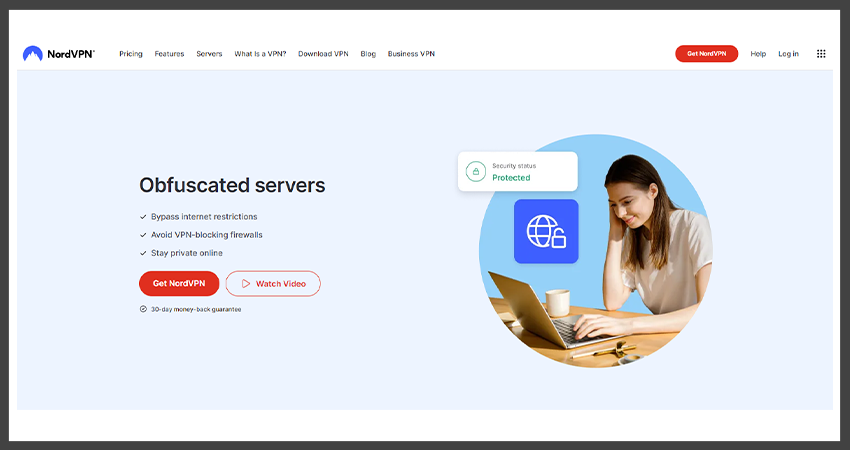
So when a VPN-encrypted data packet is inspected by DPI and it detects the VPN metadata, firewalls and anti-VPN technologies deny access to websites, which translates on your screen as “access denied” or “proxy error“.
Enter VPN obfuscation. When obfuscation is applied, the VPN signature and any traces of it “disappear” from the data packet. Thus, the firewall, unable to see any suspicious metadata, allows the packet to pass through like regular traffic.
The methods of VPN obfuscation employed by VPN providers slightly differ, but they’re essentially doing the same thing – encrypting, swapping, and hiding the VPN metadata in data packets.
OpenVPN over SSL/SSH
The OpenVPN data in the data packet gets sort of enveloped in the SSL encryption like a protective layer of armor that the DPI cannot penetrate.
In other words, your VPN encryption gets further encrypted and thus hidden. Then it’s able to pass as regular HTTPS data, as it also uses SSL encryption. The same applies to using an SSH tunnel for encryption, except this protocol is not nearly as popular as SSL and is mainly used in businesses.
SOCKS5 Proxy or Shadowsocks
Shadowsocks, a product of the innovative mind of a Chinese programmer, is an open-source client specifically designed for the SOCKS5 proxy.
This ingenious creation was born out of a need to combat the stringent internet restrictions and rampant censorship that are prevalent in China. The SOCKS5 proxy, in its functionality, bears a striking resemblance to the SSH tunnel.
This is primarily because it has the capability to make VPN encrypted traffic appear as HTTPS, thereby effectively camouflaging it.
This unique feature ensures that neither Deep Packet Inspection (DPI) nor robust firewalls have the ability to penetrate it, thus providing an unassailable shield against any form of intrusion.
OpenVPN Scramble
OpenVPN Scramble, also known as XOR obfuscation, uses the XOR additive cipher to encrypt the OpenVPN signature in the data packet, turning it into random code that has no meaning and thus goes unidentified by the DPI.
However, the scramble method of VPN obfuscation is somewhat controversial, as the XOR cipher itself is relatively simple, and therefore not uncrackable. It may help VPN traffic bypass anti-VPN technologies, but this isn’t entirely guaranteed.
Obfsproxy
Obfsproxy is a project parallel to the Tor project designed to help bypass blocks on the Tor browser. It works in a manner similar to other obfuscation methods – by encapsulating VPN traffic in a protective layer and altering its appearance to HTTP traffic.
One difference the Obfsproxy encryption has from other methods is that it uses a handshake that has no recognizable byte patterns.
While this adds a certain layer of security, it also has some drawbacks – more advanced DPI technology could detect the unnatural randomness of the handshake and thus not allow the encrypted traffic through.
Why Opt for a VPN with Obfuscated Servers?
You might wonder if a regular VPN is sufficient to ensure safety and access to restricted content online. Unfortunately, that’s not always the case.
There are scenarios where a VPN with obfuscated servers is the only viable solution. Here are some reasons why you should consider using an obfuscated VPN:
- Bypass internet restrictions: In countries like China or Iran, internet access and certain websites are heavily restricted and monitored, and VPN usage is illegal and blocked. In countries with more relaxed laws, schools and universities may also block access to certain websites and monitor VPN usage. Using a VPN with obfuscated servers allows you to bypass these restrictions and gain access to any websites and content you want.
- Avoid ISP throttling: Some ISPs might throttle your internet speed if they notice you engaging in high-speed online activities such as torrenting or gaming. While using a simple VPN should be sufficient to avoid this, one can never be completely sure. An obfuscated VPN connection will ensure that no ISP will see either what you are doing or whether you’re using a VPN.
- Unblock streaming websites: Streaming platforms are becoming increasingly inventive in maintaining their geoblocking practices and combating VPN usage. Using a VPN with obfuscated servers or protocols ensures undetection, allowing you to enjoy streaming content that would otherwise be unavailable to you.
- Increase your privacy and anonymity: This is as straightforward as it gets: obfuscated servers and protocols add an extra layer of privacy to your already encrypted connection, ensuring your complete anonymity online.
How to Connect a VPN to an Obfuscated Server?
Despite the clear benefits of obfuscated servers, not all VPNs offer them. Some, like Surfshark or ExpressVPN, instead offer Stealth Mode that includes various features, or just the OpenVPN Scramble.
Usually, you can find these obfuscation options in the advanced settings of the VPN apps, but the connection process may vary from provider to provider.
Here’s a brief guide on how to connect to NordVPN’s obfuscated servers:
- Install NordVPN on your device and login.
- Open the app and go to settings in the lower left corner.
- Go to ” Auto-connect” settings and disable “Choose a VPN protocol and server automatically”. Choose the OpenVPN (TCP) protocol.
- Go to “Advanced” settings and turn on “Obfuscated servers”.
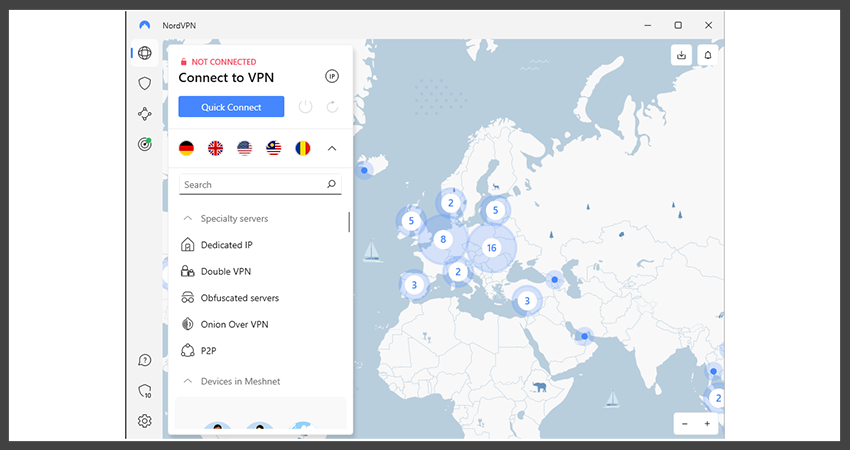
- Return to the main page and find “obfuscated servers” under the ” Specialty servers” section.
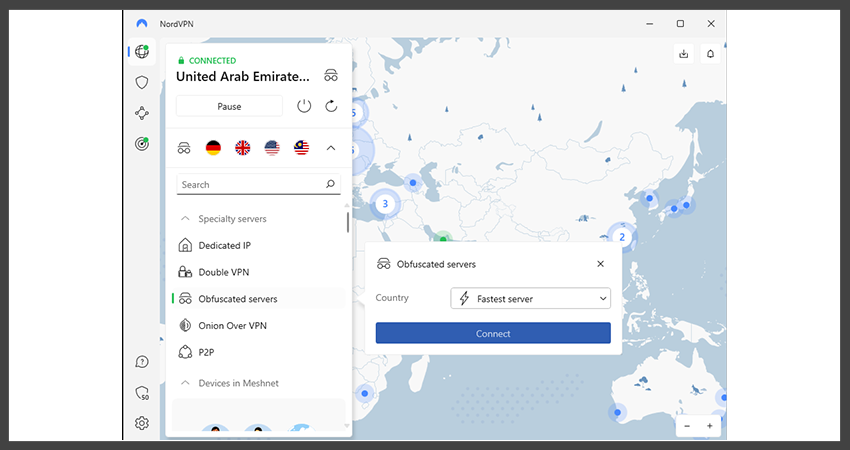
- To connect, click on the “Obfuscated servers”. You are now connected.
Troubleshooting: Obfuscated Servers Not Working?
If for any reason the obfuscated servers and/or protocols of your VPN provider are not working, i.e., access to websites still gets denied, here are some things you can do to resolve this issue:
- Connect to a different obfuscated server: Trying a different server may be all you need to fix the problem.
- Update and relaunch your VPN client: If connecting to a different server didn’t work, try the classic “turn it off and on again”. Log off, update the app, and log back in – any temporary bugs should be cleared.
- Temporarily disable your antivirus or firewall: Your antivirus and/or firewall software can be quite restrictive with background activities it allows. It could be preventing your VPN client from working properly.
- Troubleshoot your device: The problem could also lie with your device, so be sure to check your VPN provider’s help center for guides on how to troubleshoot your device to see if it’s interfering with the VPN activity.
- Re-install your VPN client: There might be a more permanent issue with the app on your device. Try uninstalling and reinstalling it on your device – that way, you’ll get a new, fully updated version of the VPN client.
- Contact customer support: If nothing works, or if you are unsure what steps to take, you can always ask for help. Reach out to your provider’s customer support agent.
- Switch to another VPN provider: Perhaps your current provider’s obfuscation service is not functioning, and it’s time to look for another provider. If that’s the case, check out our best VPN page and find a new and reliable VPN.
Wrapping It Up
A VPN with obfuscated servers is a valuable asset, as it can help you access online content that is restricted by your government, school or workplace, or your ISP, or by websites that use anti-VPN technologies.
By using obfuscated servers, you’ll be able to access geo-restricted content on streaming platforms, bypass social media blocks, and visit other restricted websites. Moreover, obfuscated servers offer an enhanced level of privacy online, as well as additional security.
The best VPNs that offer obfuscated servers and other obfuscation features are NordVPN, Surfshark, and IPVanish.
FAQ
What is an obfuscated server?
An obfuscated server is a server that uses extra encryption to hide the fact that you’re using a VPN from restrictive governments, internet service providers, or streaming services. These parties may block VPN usage, and obfuscated servers help bypass these blocks.
Will my traffic still be encrypted if I use obfuscated servers?
Yes, your traffic will remain encrypted as long as you’re connected to a VPN, even when using an obfuscated server. Obfuscation adds an extra layer to the VPN connection itself, hiding it from Deep Packet Inspection (DPI) and other anti-VPN technologies.
Are obfuscated servers slower?
Yes. Because obfuscated servers double the encryption applied to your data, it takes more time to process. This slows down your internet connection speed.



